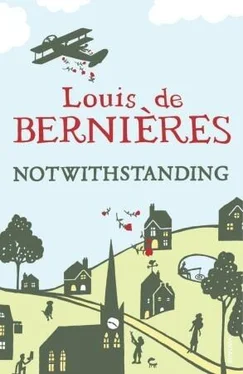THE GENERAL, MC, DSO, veteran of Burma and the Malayan Emergency, late of Sam Browne’s Cavalry and the 9th/12th Lancers, goes out into his garden at half past seven in the morning and inhales the air deeply. Across the de Vico fields comes the cuckoo call of Miss Agatha Feakes as she summons her menagerie, and from behind the row of council houses comes the splutter of John the gardener’s secret motorcycle as he sets off to work on the stud farm of the ever-absent Shah of Iran.
The General flexes and stretches the muscles of his arms, and then squats down and bounces against the elastic sinew of his thighs. It would be clear to any observer, should there be one, that here is a man who has been strong and healthy all his life. He is barrel-chested, solid and hairy. There is something faintly simian about both his body and his face. His eyes are small, round and black, and the skin of his back is dark brown from years under the sun both in the tropics and in his Surrey garden, where he cultivates azaleas and hydrangeas in the acidic soil. The General believes in cold showers, the Englishness of God and the civilising effect of the Empire. He loves his country, his wife, his walking stick, his pipe collection, his old black Labrador and his Rover P4. He has had them respectively for eighty-five years, fifty years, forty-five years, forty years, twelve years and ten years. His wife has recently died, taken off by cancer’s cruellest devising, but it doesn’t seem to have sunk in yet, and he still makes two cups of tea in the morning, uncomplainingly removing hers from her side of the bed as soon as it goes cold. He improvises strange crude suppers for both of them, and eats her portion cold for lunch on following days. He has attempted to use the washing machine and has now, on maximum temperature, shrunk all of her old jerseys and cardigans, folding the felted, miniaturised versions back into the woollens compartment of her chest of drawers. Now that she isn’t wearing them, it seems a good opportunity to get them all clean and ready.
Anyone observing the General’s robustness as he deep-breathes in his garden in early summer, amid the blooms of his azaleas, would find it easier to do so on account of his nudity. He has emerged in a state of nakedness out of sheer innocence, and now he goes back indoors with the fixed intention of driving to Haslemere to buy something, although quite what he does not yet know. He scrutinises himself in the hall mirror, and beetles his brows in puzzlement. ‘Dear me, old boy,’ he says to himself at last, ‘you’ve forgotten your tie. Letting yourself go. Can’t have that. Have to give yourself a good dressing-down.’
He strides upstairs, reaches a regimental tie from the wardrobe, realises that he needs a collar around which to tie it and fetches a shirt from its hanger. He then understands that the ensemble is incomplete owing to the lack of a waistcoat and blazer. He calls his ancient dog. ‘Bella, Bella, old girl!’
Bella is deaf, but she is already waiting by the front door, her tail wagging on her portly rump. Her dugs are blotchy, dark and pendulous after three litters (one of them accidental), and her muzzle is silver. The wrists above her front paws are swollen with painful arthritis, and she waddles breathlessly when she walks. She is the last and the best of the General’s gun dogs, but, like him, she has given up shooting. Now, like him, she just likes to go out in the car.
The General opens the door of the Rover, and Bella puts her front paws up on the back seat. The General bends down, grasps her rear legs, and propels her into the interior. This is how they have managed it for the last two years, ever since Bella seized up.
The General starts up the car and guns the accelerator. It feels peculiar, and he realises that he has forgotten to put his shoes on. He goes back inside and wanders about until he looks down at his feet and remembers what he was after.
Bella and the General go the back way to Godalming, a town once famous for being the first to have street lighting, and for being the home of Mary Tofts, who was frightened by rabbits in the spring of 1726, and consequently gave birth to a litter of eighteen of them in November. Nearby, and less explicably, the ghost of Bonnie Prince Charlie strolls beneath the trees of Westbrook.
The General motors up Malthouse Lane, past the convent. He passes the hedging and ditching man, who, in the attitude of Hamlet cradling Yorick’s skull, is waist-deep in the verge-side ditch, inspecting the freshly excavated hubcap of a Riley 1.5. The General drives past the Glebe House, through Hascombe, and finally parks his car behind the new Waitrose. He sets out past the public conveniences, past the Christian cafe, and out into the high street, where he pauses in puzzlement. It all looks wrong. He scratches the top of his head in bemusement. He stops a middle-aged woman and asks, ‘I say, please do excuse me, but is this Haslemere?’
She looks at him in horror and alarm, says ‘Godalming’ and hurries away. ‘Damn and blast!’ exclaims the General. Now he can’t buy whatever it was that he intended to get in Haslemere. Never mind, he will go to Lasseter’s instead, because a man can never have too many nails and screwdrivers and clothes pegs and whatnot. He might go and look in the window of William Douglas, too, because he has never lost his love for the things of boyhood, such as cricket balls, catapults and airguns.
He is but halfway there when he is accosted by a police officer. ‘Excuse me, sir,’ says the latter, in that portentous tone much favoured by the British police, ‘may I have a word?’
The General trusts and approves of anyone in uniform, and he smiles delightedly. He thinks that no doubt the policeman has some weighty issue to deal with, and feels the need to take advantage of his wider and deeper experience. The policeman ushers him gently into the alleyway beside the pub where Peter the Great once stayed, when Godalming was on the main wool route to London. ‘Do you realise, sir,’ asks the officer, ‘that you have gone shopping without your trousers on?’ Sensitively he refrains from mentioning the lack of underwear. Fortunately the tails of the shirt are long, and any indecency is sufficiently concealed in shadow.
The General looks down, but sees only the polished toes of his shoes. He raises a knee and beholds the nakedness of his leg. ‘Ah,’ he says. ‘Damned embarrassing. Can’t imagine … so sorry. Have to keep an eye on that, eh? Can’t be having that, can we? Definitely not cavalry. Damned embarrassing. No socks either. Whatever next! Have to give myself a rocket!’
‘May I ask your name, sir?’ enquires the policeman. ‘Then we might be able to help you.’
The General puts his hand to his eyes, and thinks hard. ‘Remember my number,’ he says at last. ‘Always remember my number. In case of capture, you know. Second Lieutenant, um … 734 …’ he begins, but then stops. ‘Damn it! Damned if I haven’t forgotten. Won’t do at all.’
‘I think you’d better go home and put some trousers on,’ says the policeman. ‘Do you think you can find your way? Perhaps you can tell me your address?’
The General reflects futilely, and offers, ‘Used to have a place in Simla. Little bungalow. Hot season, you know. Unbearable anywhere else. Wives and children always sent to Simla.’
The policeman sighs, and then asks, ‘And where did you leave your car, sir?’
‘Is this Haslemere?’ asks the old soldier.
‘Godalming, sir,’ says the policeman.
‘Blast it,’ says the General.
The policeman takes the General by the arm and they walk around the car park looking for his car. The policeman has radioed into the station and they have advised him of the probable identity of the old warrior and his vehicle. This has happened several times recently, but the General usually recovers in between. Social services have been informed, the children are making arrangements and wheels are in motion.
Читать дальше












